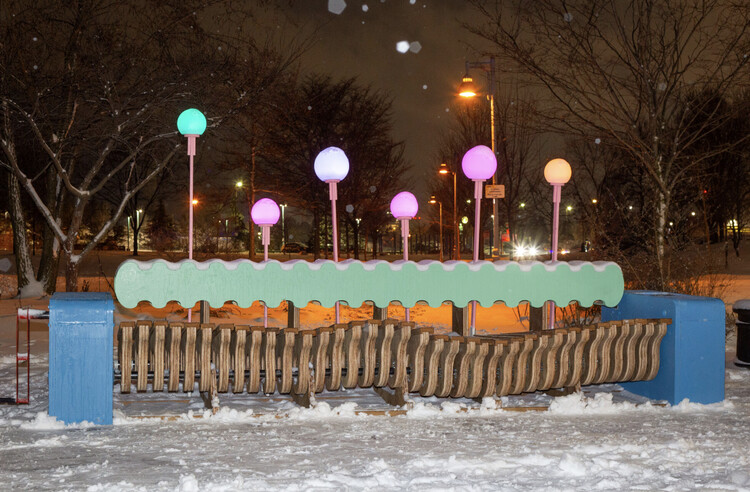
Winter Stations, now in its 10th year, has unveiled the winning designs selected from a pool of hundreds of submissions worldwide. Following an international design competition launched in November 2023, designers, artists, and architects contributed with bold proposals to reimagine the lifeguard stations along Toronto’s east-end beaches for the winter. Launched by RAW Design, Ferris + Associates, and Curio in 2014, the event aims to gather an international design and art community to join in this playful exercise of rethinking public spaces through bold temporary interventions. The winning designs were realized with the support of Anex Works, a Toronto-based fabrication group, and will be on display until the end of March.
For its 10th anniversary edition, the chosen theme for this year is “Resonance,” hoping to challenge designers to reflect on the artistic legacy and enduring impact of the Winter Stations and to embark on a journey of reinvention and reimagination. The projects were invited to recreate and reinvent installations from previous Winer Stations editions, offering moments of contemplation and remembrance. The event also continues the tradition of the Lifeguard Sands, inviting designers to incorporate them into their designs without structurally altering the stands in any manner.
Read on to discover the 2024 Winter Stations winners.
We Caught A UFO!
Xavier Madden and Katja Banovic

The project builds upon the project “In the Belly of a Bear,” reimagining the lifeguard chai as a cozy yet surreal space. The title references the rumors and whispers of UFA sightings across Lake Ontario but adds physical proof of its existence. Caught under a net, the UFO is clad in glimmering aluminum foil, signaling its foreign status. The public is encouraged to take cover from the wind and cold by climbing inside it and exploring a different perspective of the lake through pink-tinted windows.
A KALEIDOSCOPIC ODYSSEY
Brander Architects Inc (Adam Brander, Nilesh P., Ingrid Garcia, Maryam Emadzadeh)

The intervention aims to create an immersive experience that challenges reality and stimulates imagination. The installation, an adaptation of Kaleidoscope of the Senses, 2020, scales a traditional kaleidoscope 84 times to a human scale, allowing visitors to enter the instrument and become part of its wonder. The device is purposely severed into two parts, with a unique space between them.
Making Waves
Adria Maynard and Purvangi Patel

The installation proposes a whimsical piece of furniture that showcases how simple actions can have ripple effects, resonating across time and space and moving others in surprising ways. Taking the shape of an exaggerated couch, the intervention strives to create an unusual urban living room where neighbors can gather, play, and sit together by the water. Inspired by kinetic sculptures and whirligigs, the design is composed of a series of parts that dance when cranks are turned. Making Waves pays homage to the 10 years of Winter Stations and the ways that public art can foster shared delight, contemplation, and play.
NIMBUS
David Stein

Inspired by the 2016 installation Floating Ropes, the installation brings playful shapes and colors, evolving the previous concept by adding saturated blue ropes hanging below a bubbly white structure. The station asks visitors to consider the presence and absence of rain in our contemporary world by bringing attention to both extremes of weather patterns, severe storms, and flooding contrasted with drought and desertification.
Bobbin’
Max Perry, Jason Cai, Kenneth Siu, Simon Peiris, Yoon Hur, Angeline Reyes, Oluwatobiloba Babalola, Yiqing Liu, Kenyo Musa, Ali Hasan; University of Waterloo School of Architecture

The installation represents an invitation for visitors to tap into their whimsical memories. It shelters visitors with slats that create an ever-changing threshold between the bobbing zone and the surrounding beach. Inside, seesaws draw from the playground-like Sling Swing and Lifeline projects. All materials have been sourced from previous student projects or salvaged from the community of Cambridge. As you navigate through, bobbing up and down, a fresh perspective unfolds, encouraging resonance with the surrounding and past Winter Stations.
Nova
Jake Levy, Emily Lensin, Luca Castellan, and Nathaniel Barry; Toronto Metropolitan University - Department of Architectural Science

Nova reimagines the geometric pattern created by a star crushing on top of a lifeguard station and illuminating Woodbine Beach throughout the night. Inspired by origami and taking cues from the past decade of Winter Stations, Nova introduced 3D printing holding up a textile canopy with steep pipe connectors. The star pavilion shields users and encourages them to engage with their surroundings, and the lifeguard station makes a beacon for users to access panoramic views of the beach.
WINTERACTION
University of Guelph – Department of Landscape Architecture (Afshin Ashari, Ali Ebadi, Jacob Farrish, Cameron Graham, Ngoc Huy Pham, Ramtin Shafaghati, Zackary Tammaro-Cater) and Ashari Architects (Amir Ashari, Sara Nazemi, Anahita Kazempour, Hakimeh Elahi, Yasaman Sirjani, Zahra Jafari)


WINTERACTION is a dual digital installation in Iran and Canada, aiming to foster solidarity and social interaction between the two nations. Designed as an introspective journey through a labyrinth, the installations symbolize the complex quest to reach inner peace. At the center, a virtual tree emerges as a symbol of peace and alliance, evolving with each visitor's interaction at both locations.


Two other stations will return to the beach this year: CONRAD by Novak Djogo and Daniel Joshua Vanderhorst and Delighthouse by Nick Green and Greig Pirrie.
Editor's Note: This article was originally published on January 17, 2024, and updated with new photographs on March 4, 2024.
























